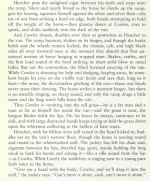GhostofKinski
Well-known member
Don Quixote please
I definitely see why people consider it the best novel in the western literary tradition, and I might even agree. I'd like to think about it a bit longer, but I found it more impressive even than Ulysses and Moby Dick and Gravity's Rainbow. There are a few others which might be contenders which I haven't read, like In Search of Lost Time, and whatnot.Don Quixote please
Read Leão-de-chácara by João Antonio, a collection of short stories around São Paulo and Rio de Janeiro about bouncers, prostitutes, and pimps. Falls into the Rabelais-Céline lineage, of which I'd appreciate more recommendations. In Brazil, I'm told Antônio de Alcantara Machado is worth looking at, and there's the much more contemporary Reinaldo Moraes I've read almost everything (Pornopopéia, Tanto Faz, Maior que o mundo).
There's tons of writing about Rio, but São Paulo really lacks the historicizing. Not much of a self-narrativizing instinct in the manner of the 60-80s authors of NYC. Not sure why...
Leão-de-chácara has some amazing urban descriptions of the historical downtown in the 50s, as well as a beautiful passage of a teenager, before becoming a pimp, riding his back to the Pacaembú stadium, just a few blocks from where I'm writing this to you.

We arranged to meet at a gloomy café on 21st Street, on the East Side in New York, where Pynchon had never set foot nor intended to set foot again. The writer is known for a single gym portrait from 1953, in which he appears buck-toothed and with a pompadour, looking like a happy fool. Obviously I didn't recognize him when he walked in—and at some moments throughout the interview I came to doubt it was really him.
For example: when I asked, without much expectation, if he knew any Brazilian writers, he already had Rubem Fonseca's name on the tip of his tongue. He said he admired him and knew him personally. They had met in New York. He was being serious. I thought the revelation would only add more verisimilitude to the implausibility of my interview, contributing to the fictional effect he wanted to create for the reader. Nobody (especially none of the Brazilian fans) would believe that he personally knew Rubem Fonseca.

John Hawkes, The Lime Twig. I've got this Penguin thing with three of his novels bundled together and it's the first of them. Never read him before and really impressed. It dips a bit when he spends too long discussing some men smuggling a horse off a barge at night, but something about the way he writes. There's this great description of the fog rolling in off the water and he just has this intriguing way of describing things. He's not quite like anyone I've read before. The choice of words, the way the narration moves around. Something really sad about it too. Very bleak, bittersweet kind of worldview.


